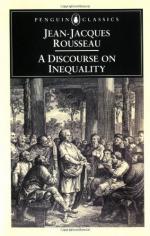
|
| Name: _________________________ | Period: ___________________ |
This quiz consists of 5 multiple choice and 5 short answer questions through Chapter 4, A Discourse on the Origin of Inequality, Part One.
Multiple Choice Questions
1. Which of the following are NOT the natural enemies of mankind, mentioned in "Chapter 4, A Discourse on the Origin of Inequality, Part One"?
(a) Old age.
(b) Disease.
(c) Animals.
(d) Money.
2. What does inequality cheapen according to Rousseau?
(a) Virtue.
(b) Compassion.
(c) Weatlth.
(d) Love.
3. What makes use of human understanding, according to Rousseau?
(a) Law.
(b) Nature.
(c) Grammar.
(d) Brain.
4. What do men have that can be combined, according to Rousseau?
(a) Senses and fears.
(b) Fears and wants.
(c) Ideas and senses.
(d) Ideas and desires.
5. What type of rights does Rousseau want the cities in his State to have?
(a) To make peace.
(b) To make laws.
(c) To make war.
(d) To vote.
Short Answer Questions
1. What does the dissolution of morality follow according to Rousseau?
2. How did older centuries think of natural law, according to Rousseau?
3. What was the state of France, according to Rousseau, as a result of the introduction of the arts and sciences?
4. What does "A Discourse on Inequality" of Rousseau's focus on aside from morality?
5. What is a natural virtue considered to be, according to Rousseau?
|
This section contains 237 words (approx. 1 page at 300 words per page) |

|




